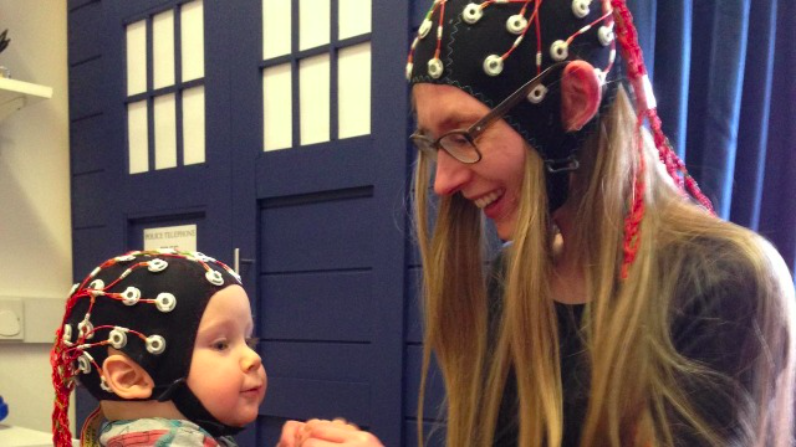Credit: University of Cambridge
Mothers’ and babies’ brains work together as a ‘mega-network’ by synchronising brain waves when they interact. The level of connectivity of the brain waves varies according to the mum’s emotional state: when mothers express more positive emotions, their brain becomes much more strongly connected with their baby’s brain. This may help the baby to learn and its brain to develop.
The research, published in the journal NeuroImage, used a method called dual electroencephalography (EEG) to look at brain signals in both mums and babies while they were interacting with each other. They found that mums and babies tend to synchronise their brain waves – an effect known as interpersonal neural connectivity – particularly in the frequency of 6-9 hertz, the infant alpha range.
Mothers and babies tend to spend a lot of time together in a positive emotional state, in which their brains are very connected. The study found that positive interaction, with lots of eye contact, enhances the ability of mother and infant brains to operate as a single system. This promotes efficient sharing and flow of information between mother and infant.
“From our previous work, we know that when the neural connection between mothers and babies is strong, babies are more receptive and ready to learn from their mothers,” said Dr Vicky Leong in the University of Cambridge’s Department of Psychology, who led the study. “At this stage of life, the baby brain has the ability to change significantly, and these changes are driven by the baby’s experiences. By using a positive emotional tone during social interactions, parents can connect better with their infants, and stimulate development of their baby’s mental capacity.”
“Certain areas of the brain are essential in the development of our ability to understand the social cues necessary to build relationships and develop trust.”
– Dr Beck
The results also suggest that babies of depressed mothers may show less evidence of learning because of a weakened neural connection between mother and infant. Mothers who experience a persistently low or negative mental state due to clinical depression tend to have less interaction with their baby. Their speech is often flatter in tone, they make much less eye contact, and they are less likely to respond when their baby tries to get their attention.
“Our emotions literally change the way that our brains share information with others – positive emotions help us to communicate in a much more efficient way,” said Dr Leong. “Depression can have a powerfully negative effect on a parent’s ability to establish connections with their baby. All the social cues that normally foster connection are less readily available to the child, so the child doesn’t receive the optimal emotional input it needs to thrive.”
“Emotional communication between parents, mostly mothers, and their children is crucial during early life, and with infants that connection usually involves intimate eye contact”. said Dr Randy Beck, internationally recognised expert in non-invasive brain stimulation techniques and executive director of the Institute of Functional Neuroscience (IFN). “We have recognised the importance of this communication in development of a variety of brain areas and have developed simple but effective methods for moms and babies or young children to stimulate areas of their brains that may not have received this stimulus in sufficient quantity to develop at a normal rate.”
As a social species, humans share emotional states with others. “Our emotions literally change the way that our brains share information with others”
-Dr Leong
Dr Beck described how recognition and treatment can be helpful to people suffering from a variety of dysfunctions that may include depression, ADHD, PTSD, Autism and others “Certain areas of the brain are essential in the development of our ability to understand the social cues necessary to build relationships and develop trust. We can now identify these areas and measure the clinical progress of treatment with the technology we use at IFN. This allows us the opportunity to help a variety different emotional or social dysfunction in both adults and children that were not possible even 5 years ago.”
If you would like to contact the Institute of Functional Neuroscience to get more information or to book an initial assessment please call us on 618 6254 2282 or send us an email at [email protected].
Reference: Santamaria, L., Noreika, V., Georgieva, S., Clackson, K., Wass, S., & Leong, V. (2019). Emotional valence modulates the topology of the parent-infant inter-brain network. NeuroImage, 116341. https://doi.org/10.1016/j.neuroimage.2019.116341
Note: material may have been edited for length and content. For further information, please contact the cited source.
